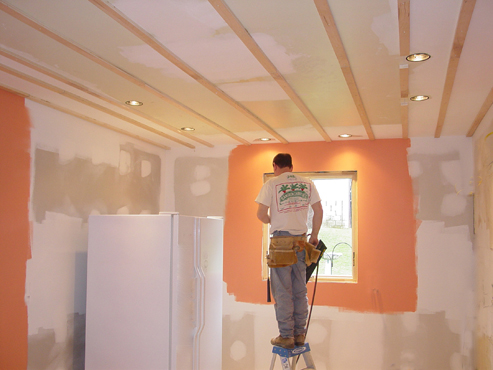The Reserve Bank’s LVR requirements, along with tighter bank lending conditions, mean that many investors are taking time out from the market right now.
But investors shouldn’t think that just because they’re not buying new properties it doesn’t mean they can’t boost the value of their portfolio.
For investors wanting to better realise the worth of the existing properties, there are ways and means.
Here are our six top suggestions for how investors can maximise the value, and increase the equity, that lies within their portfolio.
1. Do some clever renovations
New Zealanders are notorious fans of renovation work. And carrying out cost-effective renovations is a tried and tested way of adding value to a property. But it is essential not to get carried away and over-capitalise on renovation work.
While there is a huge range of renovation work that can be done to revitalise a property, it is some of the simplest jobs that have the best results. For example, the value of a good paint job should never be underestimated. Likewise, refreshing, or even redoing, tired kitchens and bathrooms pays dividends.
2. Go for healthy homes
Recent changes to the Residential Tenancies Act mean that, from 1 July 2019, ceiling and underfloor insulation will be compulsory in all rental homes where it is “reasonably practical” to install it. Additionally, demand for warmer, healthier, more sustainable homes continues to grow strongly.
That means that making a property warmer and drier – by doing such things as installing insulation and putting in HRV systems and heat pumps – is a solid value adding tactic. Not only do they make properties more attractive to good tenants, but they protect them from moisture and damp related damage.
3. Add a bedroom
Experts agree that adding another bedroom into a house is the best strategy to employ when looking to boost a property’s value. This is because houses with more bedrooms, or space, are popular with tenants and families – which means higher rents and higher sale prices.
It is most cost-effective to do this by squeezing more bedrooms from the same footprint. This often means simply walling off part of the living space. But, if the layout allows, another popular conversion involves moving the kitchen into the living area and converting the old kitchen into a bedroom.
Investors should do their homework before embarking on such a job. Costs can vary quite widely and it is important to get sensible design advice and not to over-spend.
4. Build a minor dwelling
If a property is of the right size to accommodate it, constructing a minor dwelling which can be rented out separately can work well. There are a range of options here: it might be possible to convert an existing garage into a self-contained flat or a new granny flat could be built.
Costs, consent requirements and utility needs vary a lot in this area. Not only are they dependent on the type of dwelling opted for, but they are also dependent on the size of the property, the slope of the land, whether excavation work is needed or what the council wants.
But there is also room for creativity. These days, there is a growing use of smarter, more affordable build processes like prefabrication or container conversion.
5. Use land more effectively
Many New Zealand houses sit on big blocks of land which are often under-utilised.
For investors with such properties, it can pay to sub-divide the property and get two titles. Doing so doesn’t mean another dwelling has to be built right away: there is value in two titles especially if one comes with building consents. Just remember not to overlook the time and costs that can be involved.
Alternatively, for those with the funds and inclination, there is the option of removing an existing dwelling from a large block and developing the site more effectively. That could mean building some townhouses, or even apartments rather than big standalone dwellings.
6. Boost revenue streams
Increasing the cash flow that a rental property is pulling in always adds value. That’s why adding a bedroom is such a popular strategy. But there are other revenue boosting options which don’t require any building work.
One classic example is renting a property out room by room to tenants rather than renting the whole property out to lease-holding tenant. Bear in mind that renting room-by-room to six or more tenants qualifies the property as a boarding house.
But these days there is also the option of renting out properties, or rooms in properties, via Airbnb – which has the potential for a significant boost in returns.
Read more:
Top 10 value adding renovation tips
Building for the future
Boosting Auckland returns with Airbnb


![[TMM Podcast] Yelsa serves up “marine reserve” of property buyers](https://www.goodreturns.co.nz/pics/mike%20harvey.jpg)

 Search
Search
